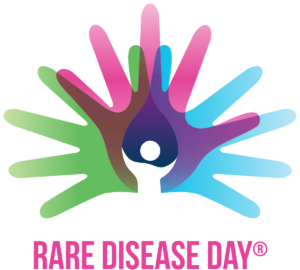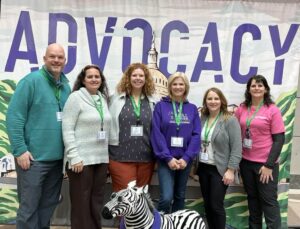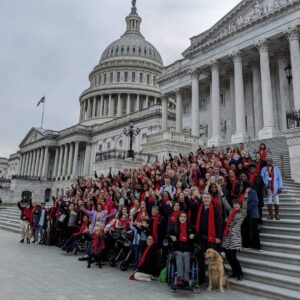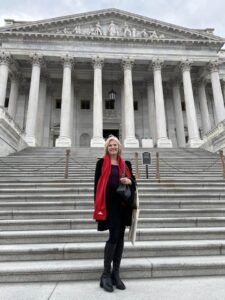Rare Disease Week on Capitol Hill
 On the last day of February every year, we pause to honor those who are living with, or have passed away from, a rare disease. The last day of February after all, is the rarest day of the year.
On the last day of February every year, we pause to honor those who are living with, or have passed away from, a rare disease. The last day of February after all, is the rarest day of the year.
It’s estimated that there are more than 10,000 rare diseases and Lennox-Gastaut Syndrome (LGS) is one of them. A Rare Disease is defined by having less than 200,000 cases in the United States. An estimated 50,000 children and adults have LGS. Of those 50,000, more than 85% continue to have seizures into adulthood and more than 95% are intellectually disabled. We need better treatments and cures for LGS, so we work alongside the EveryLife Foundation to advance rare disease causes.
The EveryLife Foundation brings together the rare disease community every year for Rare Disease Week (RDW) on Capitol Hill to learn about current policy proposals impacting the Rare Community, share their voices with members of Congress, and network with other rare disease patients and caregivers.
 This year, six LGS caregivers joined the efforts. Our mighty team of LGS Advocates included Jamie Riley, mother of Andrew (New Hampshire), Sandy Reynolds, mother of Selena (Pennsylvania), Jeannie Schnur, mother of Jackson (Virginia), Colleen & Ryan Gagnon, parents of Niamh (Massachusetts), and Jennifer Griffin, Director of Family Support at the LGS Foundation and mother of Theo (California).
This year, six LGS caregivers joined the efforts. Our mighty team of LGS Advocates included Jamie Riley, mother of Andrew (New Hampshire), Sandy Reynolds, mother of Selena (Pennsylvania), Jeannie Schnur, mother of Jackson (Virginia), Colleen & Ryan Gagnon, parents of Niamh (Massachusetts), and Jennifer Griffin, Director of Family Support at the LGS Foundation and mother of Theo (California).
Our adventures began on the evening of February 28th with a screening of Special Blood, a documentary about Hereditary Angioedema (HAE), a rare blood disorder. What stood out immediately in watching this movie, was the power of the HAE community. The meaningful connections that were made and the joy they were able to feel as they gathered together at a conference. It could’ve been the LGS community. The similarities were striking. It was at that moment that it became evident that we were all there for each other. These weren’t rare diseases competing for attention, this was the rare disease community speaking for all patients and families.
The next day we were brought together at the Reagan Building in DC for a one-day Legislative Conference where we were educated on 4 legislative ‘asks’ pertaining to rare disease. Advocating for needed legislation is of critical importance as the needs of the rare disease communities are often overlooked even though the economic burden of 379 rare diseases was close to $1 Trillion in 2019!
These 4 recommended asks were –
- Appropriations– 1) 5% increase for NCATS (National Center Advancing Translational Services) to accelerate research into developing new treatments and lowering the annual economic burden of rare diseases 2) $30 million for the Orphan Drugs Grant Program 3) $1.5 million to define “Ultra Rare”
- The BENEFIT Act– (Better Empowerment Now to Enhance Framework & Improved Treatment)- Currently, the FDA is required to listen to the patient voice, but they’re not required to disclose what impact that patient voice had during their review process. The BENEFIT Act will ensure that the patient experience data is fully considered as part of the FDA’s risk-benefit assessment.
- Become a member of the Rare Disease Caucus (for reps who aren’t) – This is a continuing ask that we make of our representatives who aren’t members. The Rare Disease Congressional Caucus helps bring public and Congressional awareness to the unique needs of the rare disease community and creates opportunities to address barriers to the development of and access to life-altering treatments giving a permanent voice to the rare disease community on Capitol Hill.
- Join a Congressional sign-on letter to the FDA requesting the formation of an Internal FDA Task Force to review and inform agency-wide rare disease activities.
 On Thursday, March 2nd, the hundreds of RDW attendees joined others from their respective states on Capitol Hill to bring these messages to their representatives. RDW is well-organized and all the meetings were scheduled for us. Because of the size of my group from California, we determined who would speak to each of the individual ‘asks’. If someone had a separate piece of legislation that they desperately wanted to discuss, they were not discouraged from doing so, but it was built into the time we had with the representative or his/her staff. When we met with our representatives from the House, the groups were much smaller. There were only 3 of us in my group so we all had a chance to speak and converse in depth regarding the needs of our communities. So many of the stories were touching and inspiring.
On Thursday, March 2nd, the hundreds of RDW attendees joined others from their respective states on Capitol Hill to bring these messages to their representatives. RDW is well-organized and all the meetings were scheduled for us. Because of the size of my group from California, we determined who would speak to each of the individual ‘asks’. If someone had a separate piece of legislation that they desperately wanted to discuss, they were not discouraged from doing so, but it was built into the time we had with the representative or his/her staff. When we met with our representatives from the House, the groups were much smaller. There were only 3 of us in my group so we all had a chance to speak and converse in depth regarding the needs of our communities. So many of the stories were touching and inspiring.
Overall, the people we met were truly caring, thoughtful and supportive of the requests that we were making. In a follow-up meeting with the other LGS Advocates, we agreed that, while the ‘asks’ were relevant and necessary, we need to begin thinking about our community and what types of legislation we’d like to see that speaks to the needs of families living with the devastation of Lennox-Gastaut Syndrome.
To that point, Sandy Reynolds told us of an advocate in her state group who chose to speak on an issue that wasn’t part of the 4 asks but was very relevant to the rare disease community. H.R. 485, the Protecting Health Care for All Patients Act, would expand access to lifesaving cures and prevent discrimination against people with disabilities highlighting the discriminatory “quality-adjusted life years” (QALY) measurement. In a recent press release, Laura Weidner from the Epilepsy Foundation was quoted saying “The QALY inappropriately devalues the lives of people with disabilities and chronic conditions like epilepsy and can result in discriminatory limits on access needed health care services and treatments.”
In our follow-up discussion, Jeannie, Jamie, Sandy, Ryan & Colleen agree that as we build our advocacy skills, we need to seek out or play a role in developing pieces of legislation that address the needs and concerns of the LGS community. I’ll share one example of the power of advocacy in the LGS community. Recently, Jamie Riley advocated for the creation of Andrew’s Rule, an initiative requesting no prior authorization insurance requirements of formula for tube-fed individuals. She shared her plan with representatives in her state. She’s established a good relationship with them that she can build on for future initiatives.
If I am asked whether the effort to make this trip was time well-spent, I would say overwhelmingly ‘YES!’ We had an audience with the lawmakers. Our voices do make a difference. We have to continue to believe that change will not take place unless families like ours are willing and able to engage with the decision-makers. Remember, they work for us.
And, as one Mom so eloquently stated, “It’s only rare until it happens to YOU!”
Watch the RDW wrap-up video here.
 Jennifer Griffin
Jennifer Griffin
Director of Family Support and most importantly, Theo’s Mom
